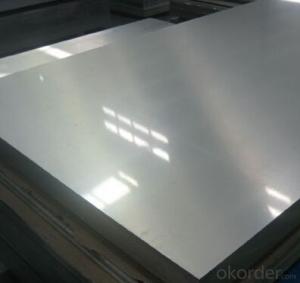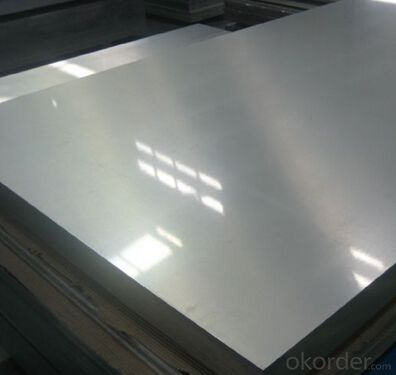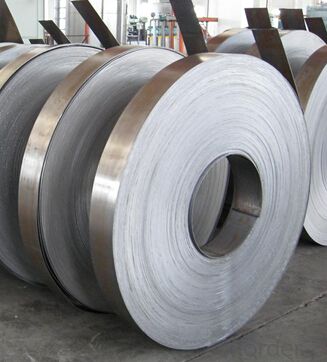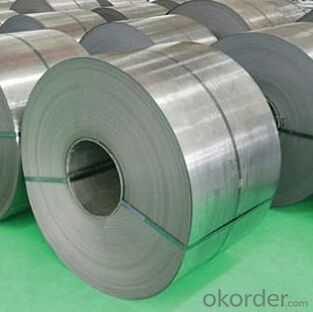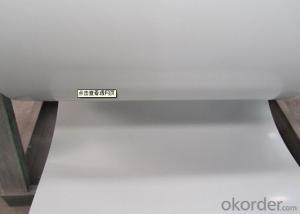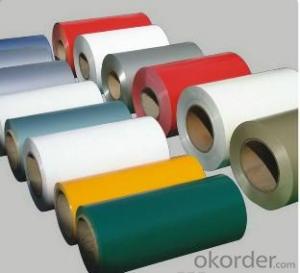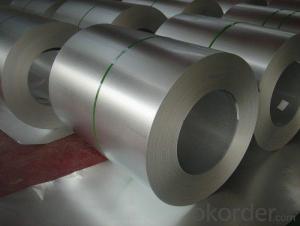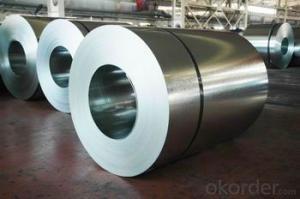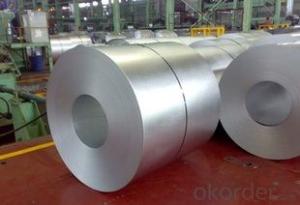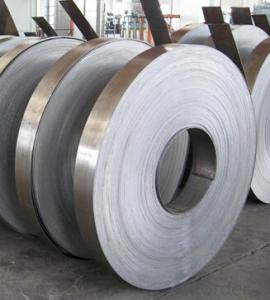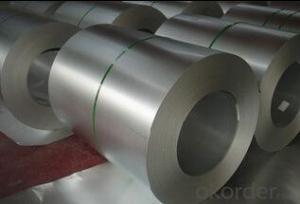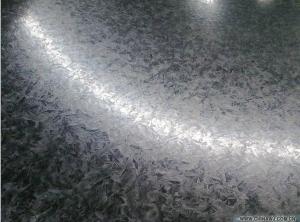Hot-dip Aluzinc Steel Coils of All Sizes
- Loading Port:
- China main port
- Payment Terms:
- TT OR LC
- Min Order Qty:
- 25 m.t.
- Supply Capability:
- 100000 m.t./month
OKorder Service Pledge
OKorder Financial Service
You Might Also Like
1. Description of the Hot-dip Aluzinc Steel:
Hot-dip aluzinc steel structure is composed of aluminum-zinc alloy, consisting of 55% aluminum, 43% zinc and 2% at 600 ℃ silicon solidification temperature and composition, the entire structure is made of aluminum - iron - silicon - zinc, to form a dense quaternary crystals an alloy.
Hot-dip aluzinc steel has many excellent features: strong corrosion resistance, is three times the pure galvanized sheet; zinc surface with beautiful flowers, can be used as a building outside board.
Applications of hot-dip aluzinc steel:
1)Building: roof, walls, garages, soundproof walls, pipes and modular housing.
2)Automotive: muffler, exhaust pipes, wiper accessories, fuel tank, truck boxes, etc.
3)Appliances: refrigerator back, gas stove, air conditioners, microwave oven, LCD frame, 4)CRT-proof band, LED backlight, electrical cabinets, etc.
5)Farm: barn, sheds, silos, piping and other greenhouse.
6)Other: breaking heat insulation cover, heat exchangers, dryers, warm water, etc.
2.Main Features of the Hot-dip Aluzinc Steel:
• Excellent corrosion resistance
• High temperature oxidation resistance
• High hot reflectance
• Good manufacturability
•Beautiful appearance
•Surface coating
•Cost-effective
3.Hot-dip Aluzinc Steel Images
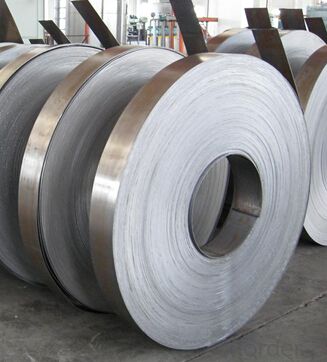
4.Hot-dip Aluzinc Steel Specification
5.FAQ of Hot-dip Aluzinc Steel
We have organized several common questions for our clients,may help you sincerely:
1.What advantages does your company have?
Cement : Annual capacity of 400 million tons, No. 1 in the world
Fiberglass: Annual capacity of 1 million tons fiberglass, No. 1 in the world.
Composite Materials — Carbon Fiber: Annual capacity of 10,000 tons PAN precursor and 4,000 tons carbon fiber, No. 1 in China
Composite Materials — Rotor Blade: Annual production capacity of 15,000 pieces, No.1 in China, Top3 worldwide
Glass: CNBM owns about 20 modern float glass product`ion lines, With annual capacity of 10 million square meters glass.
Light Weight Building Materials: Annual capacity of 1.65 billion square meters of gypsum board, No. 1 in the world.
Commercial concrete: Annual capacity of 0.35 billion cubic meters, No. 1 in the world.
Refractory Material: Annual capacity of 40,000 tons casting refractory, No.1 in the world.
- Q: What are the different types of steel coil surface coatings?
- There are several different types of steel coil surface coatings, including galvanized steel coatings, aluminized steel coatings, and organic coatings.
- Q: I was just thinking, is their a way to make steel qualities inherent in concrete, therefore eliminating the need for re bar?
- Mixing hot steel with liquid concrete would be very hazardous to your health. Steal in a molten state would flash the water in the concrete mix into steam and the steam would blow concrete and steel out of your mold. This would be about like being shot with a shotgun. This occurred in a steel mill near me some years ago on a rainy day when some steel splashed from a ladle and landed on a puddle of water, part of the siding was blown off the building and one worker sent to the hospital.
- Q: Steel seems to be much less expensive. What is the reason why? I've heard steel will ruin a barrel after time....is that true? But with the price difference maybe it don't matter? Is steel reliable? What are the negatives about steel I should know before buying?
- Steel is a cheaper material than brass. Simple as that. Steel is harder than brass as well so it can cause wear on the chamber and bolt at a faster rate. What some places do it's not pure steel but they mix in other softer metals to make the casing softer so it's not as much as issue as people make it out to be. People tend to dislike steel cased ammo as well due to it running dirtier and the coating on the casing gumming up the insides. But these people from my experience do not clean their guns. Ever. And then when they start to act up they wonder why.
- Q: I have been thinking of buying a knife that says it has damascus steel. The reason for the question is that many people told me that damascus steel does not exist anymore, and that damascus nowadays is fake. Is this true???
- damascus steel it says is made from ore containing either tungsten or vanadium, although most tools I've seen are made from chrome vanadium, it wouldn't be hard in this day and age to get the proper material. Although it DOES say in wikipedia that apparently the technique died out a long time ago due to shortage of the ore. Then it talks about reproduction attempts. So theoretically, yes, it could be the deal deal. But it does refer at the bottom about damascend steel which is made with a different technique, you could be buying one of those. NEXT TIME JUST LOOK UP THE ARTICLE YOURSELF AND READ IT
- Q: How are steel coils stored in warehouses?
- Steel coils are typically stored in warehouses by stacking them horizontally on top of each other, often using specialized racks or shelves designed to support their weight. Coils are usually aligned in rows with adequate space between each stack to allow for easy access and movement of the coils. Additionally, some warehouses may use protective materials, such as wooden or plastic spacers, to prevent scratching or damage to the coils during storage.
- Q: What is the maximum stacking height for steel coils?
- The maximum stacking height for steel coils depends on several factors, including the weight and dimensions of the coils, as well as the storage facility's structural capacity. Generally, it is recommended to consult the manufacturer's guidelines or industry standards to determine the specific maximum stacking height for steel coils.
- Q: How are steel coils used in the production of automotive body panels?
- Steel coils are used in the production of automotive body panels by being fed into a stamping press, where the coils are shaped and cut into the desired panel shapes. The high strength and durability of steel make it an ideal material for automotive body panels, providing protection and structural integrity to the vehicle.
- Q: For example, (and this is weird) if I were wearing a steel collar and I needed some way to remove it, with limited supplies.Force is difficult because it would be around my neck.Chemical cominations are great- but they have to use VERY common products. And I'm not sure what to use.Other ideas?
- There are plenty of ways to damage/weaken steel... shear or tensile force, fatigue, temperature, corrosion, grinding, etc... there are even dozens of ways to do each of the things I just listed. But in the case you suggested, with the steel being very close to skin... a simple pair of bolt cutters would probably be the easiest.
- Q: What are the different types of steel coil edges?
- The different types of steel coil edges include mill edge, sheared edge, slit edge, and deburred edge.
- Q: How are steel coils used in the manufacturing of metal structures?
- Steel coils are commonly used in the manufacturing of metal structures as they provide a convenient and efficient way to shape and form various components. These coils are unrolled and then processed through machinery that cuts, bends, and shapes the steel into the desired size and shape. This allows for precise and consistent fabrication, making it easier to assemble and construct metal structures such as buildings, bridges, and machinery.
Send your message to us
Hot-dip Aluzinc Steel Coils of All Sizes
- Loading Port:
- China main port
- Payment Terms:
- TT OR LC
- Min Order Qty:
- 25 m.t.
- Supply Capability:
- 100000 m.t./month
OKorder Service Pledge
OKorder Financial Service
Similar products
Hot products
Hot Searches
Related keywords
